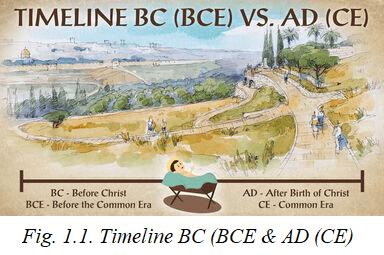B.C. - Before ChristThe Gregorian calendar is the universally recognized system for calculating dates. Despite the fact that it originated in the Western Christian tradition, its usage has expanded around the globe and today crosses religious, cultural, and language borders. B.C. is an abbreviation for "Before Christ," as in before the birth of Jesus Christ. In this case, it reflects the number of years that have elapsed since Jesus's birth. 
Origin of B.C.The word B.C. was coined by Saint Bede, an English monk who lived in the eighth century A.D. and used it in several of his works. Bede simply used the English language label "Before Christ" to refer to his time period. Bede's excellent academic standing (he is referred to as the "Father of English History") ensured that his moniker remained in perpetuity. Modern TermsThe label B.C. is no longer used by the majority of researchers today; instead, the terms BCE and C.E. have supplanted the conventional designations in the field. The term BCE stands for "Before the Common Era," whereas C.E. stands for "Common Era." It is likely that Dionysius and Bede would be upset to learn that contemporary secular historians have abandoned the tradition of establishing the calendar's beginning with the birth of Christ. Nonetheless, if you ask any historian why the dates transition from BCE to C.E. at that precise time in history, he or she will have to confess that the only explanation is that it is the traditional date for the birth of Jesus Christ, the founder of Christianity, rather than any other reason. As a result, people may refer to it by its new initials, but His birth remains the pivotal event in human history, whether we like it or not. They have no power to alter it. BCE/ CEThe BCE/CE date method was originally employed in academic writings read by people of all religions and civilizations in the seventeenth century, and it has been used ever since in an attempt to be inclusive of people of different faiths and traditions. This approach is much more precise in that it does not make any claims about the year of Christ's birth, which no one can determine for certain. In recent times, there's been widespread criticism of the use of the BCE/CE approach (Before the Common Era/ Common Era), instead of the BC/AD method to date historical facts, which has been particularly vocal. Those who oppose this classification believe that it is nothing more than an effort to "take Christ from the calendar" in order to comply with the "subversive" consequences of political correctness. However, this is not the case. Opponents argue that the usage of the terms BCE/CE is disrespectful to Christians who believe that time begins with the birth of Jesus and ends at the death of Jesus. Furthermore, it is said that BCE/CE is illogical since it relates to the exact same event as BC/AD and hence makes no sense. Those who reject the use of the "common period" label also seem to believe that the use of the BC/AD classification is mandated by the Bible or has some kind of biblical authority in some fashion. Only after another 500 years had gone BC/AD begin to be recognized as a dating system, despite the fact that there is no scriptural basis for it. However, the "politically feasible" usage of "common era" in place of A.D. initially appeared in German in the seventeenth - century C.E. and in English in the eighteenth century C.E. "Trying to remove Christ from the calendar" has nothing to do about this distinction in dating and everything to do with the truth when discussing historical facts and involving individuals of all religions in debates of historical events. HistoryAccording to the Hebrew calendar, which is still in use, events are counted back to the beginning of time, or Anno Mundi (Latin for "in the year of the world"), in order to determine when they occurred. Egyptian and Mesopotamian calendars were based on the rule of monarchs or on the seasons as prescribed by gods in ancient civilizations like Egypt and Mesopotamia. A new calendar and new month names were instituted during the reign of Julius Caesar (100-44 BCE) (49-44 BCE). This calendar was in use until Pope Gregory XIII introduced the Gregorian calendar in 1582 CE, which is still widely used today. In the early days of Christianity, many adherents followed both the Roman and the Anno Mundi calendars. A Christian monk known as Dionysius Exiguous (470-544 CE) proposed a novel notion in dating in 525 CE that laid the framework for the subsequent dating system of BC/AD. Dionysius came up with the notion of Anno Domini ("in the year of our Lord") in order to keep the date of Easter consistent. Many notable Christians at the time of his study on this topic were putting events back to Diocletian's rule in 284 CE because of their persecution of Christians. It was Dionysius' goal to unite the eastern and western churches by establishing a single day for the celebration of Easter.
Next TopicB. Ed - Bachelor of Education
|
 For Videos Join Our Youtube Channel: Join Now
For Videos Join Our Youtube Channel: Join Now
Feedback
- Send your Feedback to [email protected]
Help Others, Please Share










